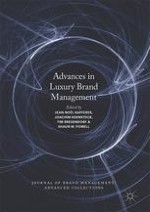2017 | OriginalPaper | Buchkapitel
Is Luxury Compatible with Sustainability? Luxury Consumers’ Viewpoint
verfasst von : Jean-Noël Kapferer, Anne Michaut-Denizeau
Erschienen in: Advances in Luxury Brand Management
Aktivieren Sie unsere intelligente Suche, um passende Fachinhalte oder Patente zu finden.
Wählen Sie Textabschnitte aus um mit Künstlicher Intelligenz passenden Patente zu finden. powered by
Markieren Sie Textabschnitte, um KI-gestützt weitere passende Inhalte zu finden. powered by
